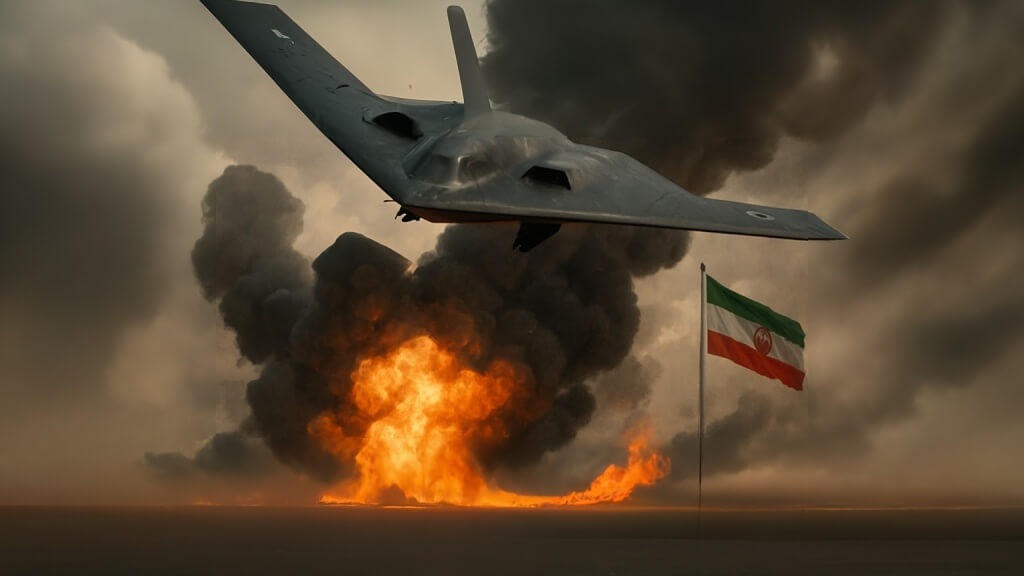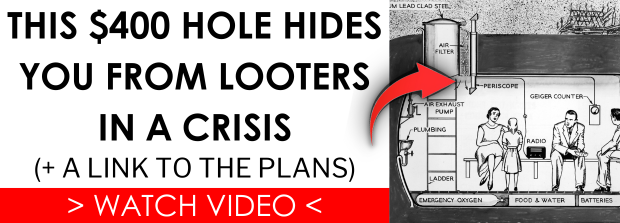The alert came in while you were probably busy doing your thing, just like me, as I was taking inventory of my pantry. Just another hot morning. But then the push notification popped up like a cold slap: “US Launches Airstrikes on Iranian Nuclear Sites.”
Not a drill. Not a rumor. Real-world engagement. Bombs falling on Isfahan. Fordow flattened—allegedly. It wasn’t long before the word “war” started drifting into the headlines like smoke from a distant fire.
Now, if you’re the kind of person who reads maps the way others read horoscopes, you probably already knew this was brewing. And if you’re a prepper or even just someone with a basic sense of foresight, you also knew this wasn’t going to be a clean surgical strike that fixed anything. You don’t poke a hornet’s nest in the middle of a gasoline warehouse and call it pest control.
Let’s talk honestly about what just happened, what it means for regular folks trying to survive in an increasingly brittle world, and why this entire mess—however it spins—feels like a rigged gamble from the start.
The First Strike That Wasn’t The Last
The US called it “Operation Midnight Hammer”, and the name alone should give you pause. Hammer? Midnight? It’s as subtle as a bar fight. In the early hours of June 22nd, American B-2 stealth bombers and Tomahawk-equipped submarines coordinated a highly planned and—on the surface—well-executed attack on three of Iran’s nuclear facilities: Fordow, Natanz, and Isfahan.
Satellite data, open-source analysts, and even mainstream media confirmed significant hits on the facilities. Bunker-buster bombs—likely GBU-57 Massive Ordnance Penetrators—were used to hit underground enrichment halls. The goal? Knock Iran’s uranium enrichment program several years back. That’s the pitch we were sold, anyway.
But here’s the catch: Iran, like any nation that’s been sanctioned half to death and surrounded militarily, didn’t just sit on its hands. They’d hardened those sites. And while the US said the damage was “devastating,” Iranian and Russian state media called it “limited and symbolic.”
We’ll probably never know how deep the craters go until inspectors get in—or something leaks. There are already some photos being shared online showing that bombs have just made deep holes in the ground and nothing else. I cannot say if those are real or not. But what’s undeniable is the reaction that came next.
On June 23, Iran launched a wave of retaliatory missiles in an operation they called “Glad Tidings of Victory.” The primary target? Al Udeid Air Base in Qatar, the forward headquarters of CENTCOM and one of the most fortified American installations in the region. Here’s the thing, though: most of those missiles were intercepted. Qatar reported zero casualties. US CENTCOM said the same.
So, a brutal first punch. Then a return jab pulled just enough to show capability without escalation. Call it a warning, or a symbolic gesture, but either way, it didn’t end there. And it never does.
So Why Did the US Really Attack Iran?
You know the official story already—“degrading nuclear capabilities,” “preventing enrichment escalation,” “defending allies.” That’s the kind of language you hear from polished podiums and State Department spokespeople with dead eyes and perfect ties. But the real answer? Well, let’s say it’s a little messier than that.
The strikes came fast as a side effect of rising tensions between Israel and Hezbollah, particularly after Hezbollah launched multiple rocket barrages into northern Israel following Israeli operations in southern Lebanon. Iran, predictably, was framed as the puppet master. And sure, Iran’s hands are all over the region—that’s no secret. But here’s where things go sideways.
A large section of the American public isn’t buying the idea that the US just had to attack. Not now. Not without congressional approval. Not when domestic inflation is strangling people at the grocery store and housing is unaffordable in half the country.
And more than that, people are noticing a pattern. The conspiracy-leaning crowd, the libertarian right, the disillusioned left—all kinds of folks are starting to say the same thing: Donald Trump isn’t running US foreign policy—Netanyahu is.
On social media, it’s not just hashtags like #WWIII or #NoWarWithIran trending—it’s #TrumpIsNetanyahusPuppet. Harsh? Maybe. But when you look at the timing, the choreography, the eerily close alignment between Israeli provocations and American strikes, it gets harder to pretend we’re acting independently.
Critics argue that Trump, already embattled by legal issues and a chaotic election cycle, needed a foreign policy “win” that plays well with the pro-Israel base and neocon hawks. A neat little show of force. Something to remind voters that he’s “strong.” However, I ask you this: Is it strength if you’re doing someone else’s bidding, or is it obedience?
And if that’s true—if American blood and funds are being used to settle someone else’s regional grudges—then we’re not just looking at a bad bet. We’re looking at an entire casino rigged against us.
When wars are launched not from necessity but from political calculation, ordinary people pay the price. You, me, the guy filling propane tanks in Amarillo, the single mom budgeting for groceries in Philly—we all get hit.
So maybe the better question isn’t “Why did the US attack Iran?”
Maybe it’s: Who really pulled the trigger?
“We’re Not At War”—But Try Telling That to Your Grocery Bill
Let’s get one thing straight. You don’t need to be in a war zone to feel the heat of war. Ask any trucker navigating fuel prices this week. Ask a single mom watching meat double in price overnight. Ask the small-town grocer whose shipments from the Gulf are now “delayed indefinitely.”
The Strait of Hormuz—yeah, that tiny neck of water at the bottom of Iran—isn’t just some strategic trivia. It’s where 17 to 20% of the world’s oil floats through. Iran hinted at closing it, and just that whisper sent crude oil futures spiking past $105 a barrel. That’s not politics. That’s your wallet. That’s your generator fuel. That’s the propane tank for your stove and the diesel that keeps farm tractors rolling.
Some of us might remember the Gulf War price hikes. Or 2008’s recession punch combo. But this? It’s different. Because this one isn’t just about markets. It’s about fragility. Everything is connected by just-in-time shipping and digital inventory chains. Break the chain in the Persian Gulf and you’ll feel it at a gas station in Nebraska or a chicken farm in rural Bulgaria.
You can already see the early signs: thinner shelves at hardware stores, price hikes on anything with plastic components (thank you, petrochemicals), and food distributors tightening their outbound schedules. You don’t need a mushroom cloud to trigger a run on supplies—you just need a spike in diesel and a few nervous wholesalers watching the Strait.
And you know what hits harder than an Iranian missile? A clerk telling you: “Sorry, we’re out of stock.”
Iran Isn’t Iraq—and That’s Where This Gets Ugly
For those old enough to remember 2003, this might feel like déjà vu. But don’t be fooled. Iran isn’t Iraq. This isn’t a country with a shattered army held together by duct tape and fear. Iran is a regional powerhouse with layered air defenses, proxy networks across the Middle East, and domestic manufacturing capabilities hardened by two decades of sanctions.
The US strikes may have been precise, even surgical, but the strategic gain? That’s fuzzy. Iran’s response was calculated. No mass casualty retaliation. No swarm of missiles on Israel. Just enough to show capability, not enough to cross a line. That kind of restraint doesn’t come from weakness. It comes from knowing you hold some cards—maybe not all of them, but enough to mess up the table.
And let’s not forget the geopolitical balance. Russia’s watching. China’s watching. The Saudis are sweating bullets under their thawed relations with Tehran. Israel’s been posturing hard for months, possibly coordinating quietly. The Gulf States? Nervous and hedging.
This isn’t chess. It’s poker with gasoline-soaked cards and nobody’s folding.
The Ceasefire That Might Not Stick
On June 24, President Trump stepped out and declared a “complete and total ceasefire” between Iran and Israel. Sounds good on paper. Iran, reportedly, was to halt hostilities first. Israel would follow 12 hours later. But by morning, reports of rockets flying into northern Israel from “unconfirmed sources” had already surfaced.
So… was it a ceasefire or just a breather?
Iran’s foreign ministry played it carefully. “We did not agree to any formal terms,” they said, emphasizing that the calm was conditional, not contractual. That tells you all you need to know. Everyone’s cooling down, not because they want peace, but because no one can afford what comes next.
Which brings us back to the common man.
If you’re waiting to hear missiles before you start storing rice, you’re already late. Because while governments count missiles, regular people count bills. The ceasefire might hold for now. But if Israel strikes Hezbollah next week, or if a US drone hits a convoy in Syria, guess what? We’re right back in the mess. And every time we cycle through this, it gets harder to pretend the world isn’t cracking.
So, What Do We Do Now? (Yeah, This Is the Part You Came For)
You’re not reading this because you want doom and gloom. You’re reading it because you want clarity. You want answers, even if they’re uncomfortable. So, here’s the straight truth, from one realist to another.
If you’re a prepper, now’s the time to tighten your strategy. Not panic. Not go full tinfoil—but assess your weaknesses like you would after a wildfire came within five miles of your land.
Fuel’s about to get tighter. Stock accordingly, rotate aggressively, and don’t be the person hoarding jerry cans the day after the pumps run dry. Keep filters ready—clean water’s the first domino in any cascading crisis. Review your backup power setup. Solar’s great, but a cloudy week and no diesel? That’s a problem you want to solve before it happens.
Food-wise, shelf-stable calories should already be in your system. But here’s something most folks forget: food for barter. Trade cans, share supplies with the network you trust. Prepping isn’t just about solo survival—it’s about outlasting the chaos with a tribe.
Keep your comms simple but layered. If the Gulf flares again and undersea cables get hit (don’t laugh, it’s happened before), you might be relying on local HAM networks or even old-school CB.
And mentally? Stay ready. Not paranoid. Just ready. There’s a difference.
Closing Thoughts—Why the Empire Never Learns
I’m an honest man and I don’t like to beat around the bush. This isn’t about Iran. Not really. This is about a failing empire needing a win, any win, to distract from the rot at home. When the debt ceiling’s a joke, when inflation’s hammering working families, when civil unrest is brewing—there’s always a foreign villain to point fingers at.
But Iran didn’t attack Kansas. It didn’t send boots into Florida. It got hit. Hard. And it hit back just soft enough to avoid nuclear hellfire. That’s not aggression. That’s restraint.
So, what happens next? Maybe this moment cools off. Maybe oil flows again. Maybe prices stabilize. Maybe we all forget about this by Christmas.
But maybe it doesn’t. Maybe someone flinches. Maybe an Israeli jet hits a convoy in Syria. Maybe a Hezbollah cell in Lebanon launches something big. Or maybe a US sub gets too close to the wrong island in the Gulf.
And then we’re in it.
That’s why we prep. Not because we want collapse. But because we’ve seen enough to know it doesn’t always come with a warning siren. Sometimes it comes with a CNN banner and a White House press release.
This was a losing bet. A short-sighted strike that might earn headlines but costs stability. And we’re the ones paying the tab.
























































































This conjecture, no proof of anything, nothing but suspicion, no fact, a lot more propaganda and hype sure isn’t worth reading. Mr. Bob Rogers, you need to find something worthwhile to live for rather than wasting time and energy in worry that is nothing more than interest paid on trouble before it’s due, and could be wholly wrong. Your fear is dominant, your tendency to panic nearly overwhelming.
Your question: “However, I ask you this: Is it strength if you’re doing someone else’s bidding, or is it obedience? And if that’s true — …” is very sad, no fact at all, lots of fear, panic and speculation. You admit at least that you have no actual knowledge of what you’re talking about either, all speculation, panic and fear. I’m so sorry for your fear, your panic, and tendency to speculation. It must be a miserable life you lead. As the old saying goes, “It’s better to keep quiet when you don’t know what you’re talking about than to open your mouth and prove to all you don’t.”
Anyone with any common sense at all knows the future is FULL of question marks and is wholly known. What is also unknown is whether we will be alive 2 minutes from now. Heart attacks, massive strokes, vehicle accidents, and a host of other possibilities could occur that would end our life.
I very much appreciate the very true statement that if something happens and we get involved and are not part of the solution we have just become part of the problem.
Hi Bob
Nobody knows exactly what will happen
I am a proud American
But like many evangelicals and others I support Israel who must defend themselves against lunacy and monsters like Iran and Hamas.
The hit from America is a different story
Trump is certainly not a puppet to Israel and Netanyahu some say Netanya hu Is the puppet
Iran the Houthis Some radical Muslim groups are dangerous for Israel And also America Saudi Arabia and other nations.
Behind the scene we don’t know
What would you do if your neighborhood was surrounded by dangerous criminals and maniacs?
Bob; This sounds like the mainstream media to me. you could be right but I have not seen any price jumps as you say and it could be that the strike was just as our Government said and Israel has destroyed so much of Iran’s military materials as they say. I don’t know either but will wait a few more days before yelling the sky is falling.. I want to act on facts not fears. FEAR GETS YOU KILLED!
RD
I totally disagree with you. First oil prices did NOT go to $105.00. I watched the market and the highest that oil went up was $75.00. Then 2 days later it was back to under $70.00 I have to admit that I skipped over most of your post. To say that Trump did this for no reason is pure BS. He has been saying for years that Iran couldn’t get a nuke. The whole world thanked him. Allowing Iran to get a nuke would have set off an nuke arms race in the middle east that would have led to a nuke war. Doing someone’s else’s work for them? I don’t think so. When the Israelis took out Iran’s air defenses, Trump saw this as the time to strike with little risk to our air men. The strike on our air base? Iran told us when they were going to launch. In short, IMO you have TDS and you hate America. The whole world is safer.
Bob Roger’s is merely trying to evoke a response and y’all fell for it.. ♂️
I wonder about Survivopedia regarding subtle clues almost as if someone among their staff chooses words that betray opposite thinking of what is written — inconsistencies. I’ve recently posted one on my suspicion that the author is not responsible for the inappropriate email titles such as hoarding which is a legal term of (weak) violations of law with ambiguities and having negative connotation compared to prudent and wise storage of what will be needed later. When I searched that article, “My Best 3 Water Hoarding Secrets,” that word doesn’t even appear in the article. Perhaps it’s deliberate to draw more into reading the article or to read carefully and totally to find and refute contradictory use of the term hoarding.
So did you! You let our responses evoke a response from you. And if Survivopedia is all about “evoking a response” any liar or unprincipled or immoral person is capable of achieving that now aren’t they? That isn’t helpful for instruction, but it sure is a good warning of who not to trust when the chips are down. From previous posts of Mr Rogers, and others, we already know by his/their own admission he/they is/are willing to kill others who have prepared to get what he/they want in his/their unprepared state, if and when the buttons get pushed to turn them into murderers, just so he/they can survive. The arrogance, conceit and hypocritical self-delusion at his/their own importance and worthwhileness of need to survive and others who have done a whole lot better job in preparing need to die so he/they can survive is incredible. Clearly they are NOT experienced preppers as they claim or they are experienced in the wrong kind of thing and have let all of us know just where they stand and what they stand for. They can easily be classified as potential domestic terrorists with what they write about what they believe and how they would behave. This post of his being ruled by fear, panic and speculation is a wonderful ownership he’s made of where the rest of his values stem from. Very sadly he is an overgrown scared little kid who has no good comprehension of how to deal with reality and that at some point in time we are ALL going to die. He can’t escape that nor can anyone else.
I work overseas…Israel. Ukraine. ROMANIA, Croatia, Egypt…to name a few….all this fear mongering is a joke. Most Americans take google as gospel. Take a flight..go to Israel, Qazrin… go to Poland. I can safely tell you, I have more anxiety coming nack to the states than going any where else on the face of the earth. I ain’t nothin’ more than an ol Texas boy that has worked in 32 countries and passed through 76..I am aware of my surrounding…and know that American fears are personal made up in your own mind. Prices go up..prices go down…big deal, what are you going to do about it ? Nothing but whine. I have mostly rambled…but I can also say, most of the world problems are oil related. No…we dont steal other countries oil. I was in Ulraine a full year before the fall of “the wall”. We were helping with infrastructure, utilities, government, a new monetary system ..the Hryvnia. All on promises of payment too soon for an upstart country. There were several ways to pay. One was oil. Came note due, Ukraini could not pay…gotcha….their oil became ours.
I wonder about Survivopedia regarding subtle clues almost as if someone among their staff chooses words that betray opposite thinking of what is written — inconsistencies. I’ve recently posted one on my suspicion that the author is not responsible for the inappropriate email titles such as hoarding which is a legal term of (weak) violations of law with ambiguities and having negative connotation compared to prudent and wise storage of what will be needed later. When I searched that article, “My Best 3 Water Hoarding Secrets,” that word doesn’t even appear in the article. Perhaps it’s deliberate to draw more into reading the article or to read carefully and totally to find and refute contradictory use of the term hoarding.
This is nothing more than bullshit and conjecture. And he probably voted for Harris and is jealous that Trump won and now he can’t peddle his fearmongering and distrust any longer. Very sad.